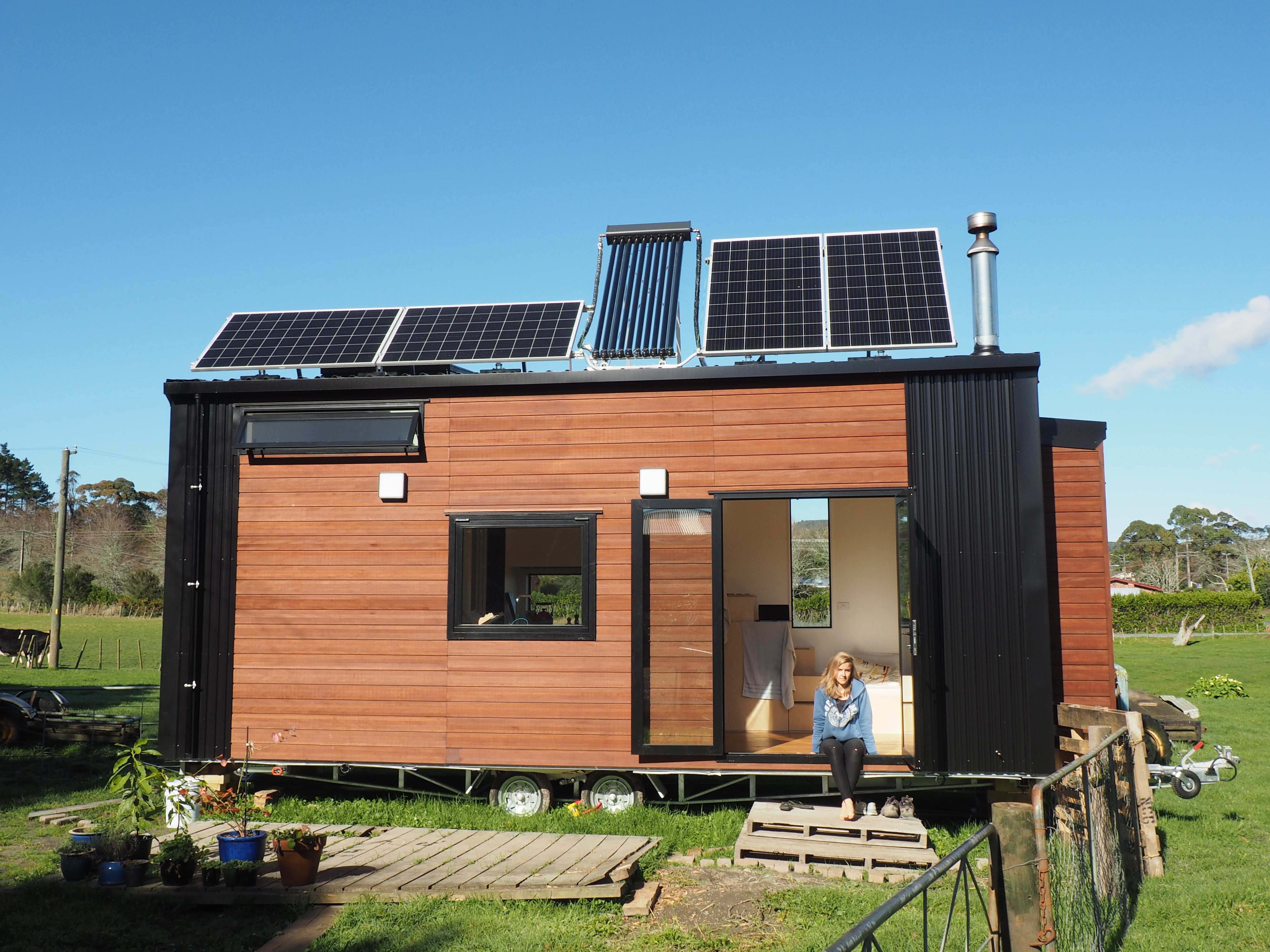Check out our video of this install!
We checked in on Tom earlier this year and had a quick chat about how he's finding off-grid life so far! He's running the Bach Kit with a hybrid inverter on his tiny house with his wife.
How did you set up your kit, and where have you got it installed?
I installed the kit myself and then an electrician made the connection from the inverter to the main switchboard and the grounding. The whole house is a DIY project, but an electrician did the connections to and from the switchboard, and a certified plumber worked alongside me on the plumbing. I have installed the 4 solar panels on the roof on the tiny house, 2 in portrait and 2 in landscape mode, to fit around the skylight, the solar hot water heater, and the chimney from our wood burner.

What are you running on your kit? What are you not running?
I am running pretty much everything on the kit, our LG fridge (linear inverter technology), a dishdrawer, a standard washing machine on good sunny days (2000w draw), a food processor, LED lighting, and I even tried to run a 1.5kw electric element (though it was a bit draining for the batteries)
What about the tiny house lifestyle appealed to you? Why did you go with the tiny house over a camper van, for example?
My wife and I are quite minimalist, we don’t see the need for a large inside space that we need to fill with stuff - we value our outdoor space much more. The tiny house is a way for us to rent a large section in order to spend our day outside. It is also a great way to have access to home ownership while being non-resident yet (soon we hope!) and on a low budget. It is also a way for me to start the new professional adventure, to start my own market garden and produce organic veggies to sell to my local community. This is thanks to the savings we are going to make from not having to pay rent while having a large section of land.
We chose this lifestyle in order to be able to bring the house to any location we would like to settle in, and also in order to be more aware of the energy our lifestyle requires and what it cost to produce it, while in the meantime respecting the planet as much as possible.
What challenges have you faced along the way?
It was quite challenging to find space for those 4 panels on such a small roof, and to find information and solutions for attaching them on tilting kits so that they could fold flat for transport, raise a bit for their summer position, and raise more for their winter position. This way I was sure to maximise energy production. It is now working great and I can switch the panels from one position to another in less than 1 hour.

Two things that almost ended badly were that I almost forgot was that we need studs in the right place to screw into for the solar panel install kit, and another was when I discovered that the hybrid inverter I got was quite big and had 2 quite big and noisy fans. I had to create an extra storage space outside the house and secure the inverter and the box into the studs through the cladding. That was not an easy task, but I am glad I don’t hear a constant fan noise in my living room!

Why did you choose solar as opposed to a generator or having like an extension cord to plug into the grid like campervans?
A cord was an option, but I didn’t know where I would like to park the house and didn’t want to restrict my options or to have to park too close to someone’s home.
Why did you choose GridFree over another company? How did you find us?
I think I found you on Google, as well as 3 other suppliers I got quotes from. I chose you because you were the only ones making solar power look as simple as it is, because you were the only ones empowering people to do it themselves and putting trust in them, because you were charging very reasonable prices for great quality materials, and because you were so helpful, easy to understand, honest, and straight forward.

What’s been the best part of the new lifestyle?
Being in the house sitting by the fire on a rainy, windy, and extremely cloudy day, using a computer, a fridge, and lighting, and watching the inverter’s data on my computer saying that I still produce more power than I am using.
Do you have any advice to other people that are planning to go off-grid?
Don’t be afraid - if you do enough research, enough planning and if you think ahead, anyone can do it.
Want to do it yourself? Get the Bach Kit here!



